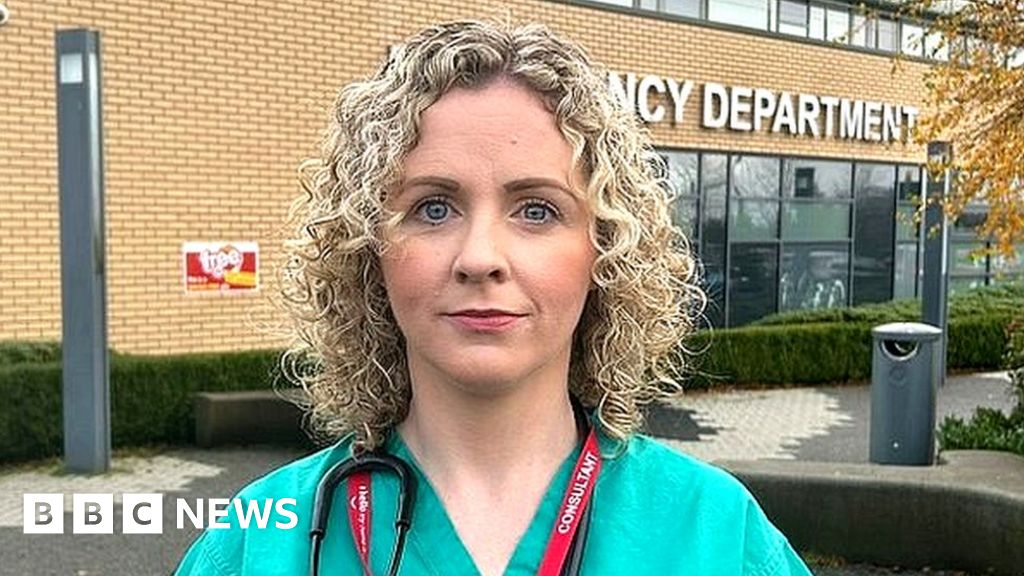- By Rebekah Wilson
- BBC News NI
Dr Kearney said physical attacks were happening at least once a week at Antrim
There have been more than 50,000 physical attacks on health and social care staff across Northern Ireland in the last five years, according to the Department of Health.
It released the figures as it launched a framework to tackle the violence.
Eimhear Kearney, an emergency consultant at Antrim Area Hospital, told BBC News NI she was assaulted while pregnant.
“I felt very vulnerable,” she added.
Staff said the attacks had a knock-on effect on waiting times and quality of care as well as on their health.
Staff at Antrim Area Hospital said most attacks happened at the Emergency Department
“I had been kicked in the tummy whilst pregnant by a patient – absolutely dreadful,” Dr Kearney said.
“It’s the first time in my career I have ever felt so vulnerable. I learnt a lot from that.
“The assaults are varying from that verbal level of insults to verbal attacks right the way up to physical and violent attacks on a weekly basis.
“Perhaps even more than that, attacks are physical.”
Dr Kearney said most attacks used to come from patients but recently relatives had been targeting staff.
“We are seeing the biggest increase is through patients and relatives who have capacity over their own behaviour.
“These are patients and relatives who are coming to a hospital environment with an expectation of what they need and what they want,” she added.
‘I thought about leaving’
Dr Kearney said health care was already under severe pressure and it was not the fault of staff.
“With the pressures on services, especially emergency departments, wait times are longer, then there is frustration.
“But frustration can very often tip over into these attacks. We can’t do anything about the pressures of the system.
“If we are experiencing unwarranted attacks that can be really horrible. It’s very hard to wash that off and provide care to the next patient.”
Dr Kearney said she has thought about leaving the profession due to the ongoing attacks.
“I have come to this profession because I enjoy the ability and have the knowledge to provide care – that is the most rewarding thing anybody could do as a career.”
Permanent Secretary at the Department of Health (DoH) Peter May said the pressures faced by healthcare workers were immense.
“The figures released today are appalling,” he added.
“Incidents such as these make their jobs more difficult. Abusive behaviour causes mental and physical harm to staff, leading to time off work and less time with patients.”
The figures show an increase in attacks of about 13% over a five-year period.
On Tuesday, the DoH released ‘Violence and Aggression in the Workplace’, a framework for health and social care staff to “prevent, reduce and respond” to violence and aggression in the workplace.
How will it work?
The framework sets out plans for risk assessments and care plans that look at the workplace and environment staff will be subject to and make sure all measures are in place to “minimise risks to the personal safety of staff”.
Members of staff will be trained regularly to be aware of the possible risks.
Incidents can be reported to the department through a form that will be recorded into a department database and it hopes this will show specific trends that can be prevented in the future.
The reporting of incidents can also be used for evidence to assist in the prosecution process.
The framework also outlines how staff can be helped after incidents occur.
‘Punched on shift’
Nurse Almira Barro said when staff are attacked it stops them from doing their job
Almira Borra, a nurse at Antrim Area Hospital, said she was punched during a shift.
She is worried it could happen again.
“Somehow at the back of your head there is a possibility of it – especially verbal abuse as people get frustrated with waiting times,” she told BBC News NI.
When she was attacked she felt like she was letting other patients down.
“I felt there are plenty of things that you could do for other patients and yet you are taken away by dealing with that situation.
“You feel like you could do better, you could do more for others who are unwell and need you the most.”
Nurse Borra said the profession for many was a calling.
“I think I am very old fashioned, you choose to be a nurse; it’s a calling for you.
“When you are at the height of pressure and these attacks – you sometimes re-think to yourself ‘is this the best profession for me?’ ‘Is it worth providing all this care to receive this abuse?’
“But in the end you come around and you do the job,” she added.

William Turner is a seasoned U.K. correspondent with a deep understanding of domestic affairs. With a passion for British politics and culture, he provides insightful analysis and comprehensive coverage of events within the United Kingdom.







